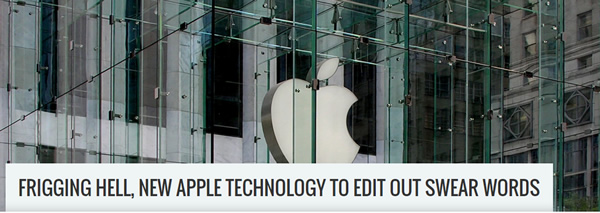Frigging Hell

The US Patent and Trademark Office has granted Apple a patent for technology that automatically scans streamed songs for swear words and replaces them. This could be with bleeps or non-explicit phrases, or with music background.
The patent, named “Management, Replacement and Removal of Explicit Lyrics During Audio Playback” was filed by Apple in September 2014, according to Business Insider.
As part of its application, Apple explained, “Generally, in order to avoid unwanted language (e.g., explicit, profane, or otherwise inappropriate language) in songs or other audio the entire song would have to be avoided.” But at least the customer can still access the track, even if it’s not the way the creator wanted it to be.
This family-friendly tech also applies to audio books where again the technology would go through a library and find an alternate word or cut out a sex scene.
Despite its hipness, Apple is prissy. It won’t have porn on the App store and banned a dictionary app which listed swear words and provided them with definitions. Its online radio station Beats 1 plays non-explicit versions of songs.
However, Apple has no immediate plans to apply the technology on iTunes or its streaming service Apple Music. That is not surprising, The technology relies on metadata, or small pieces of information that would be embedded in the audio file. It is not known how long detecting the offending words would take. There is a possibility that it may insist that content creators place a marker to warn Apple that the music or book may have problematic expressions.
This would definitely be a problem with, say, a Tupac album. 1996’s All Eyez On Me has 905 cuss words on it, while the posthumous Until The End Of Time has 895. Which hardcore rap fans would put up with the editing out of the 793 swears on UGR’s Underground Kings, the 697 on NWA’s Efil42agginand the 639 on Dr Dre’s The Chronic 2001? What is “unwanted” by Apple is the core appeal of a piece of music for a consumer.
However, there is also the possibility that the explicit-word technology might not even see light of day.
After all, Apple applies for thousands of patents a year, more to protect the copyright of its ideas from copycats than to necessarily use them. As of January 2016, it is estimated it has a total of about 20,000 patents worldwide, and 10,000 pending.
In 2014 alone, it was awarded 2,003 exclusive rights. Among them were a smart pen, transparent displays for augmented reality, an interactive holographic display, bone conducting EarPods and a camera remote control.
Also getting official protection were features as accident free buttons which ensures that it is a finger pushing them rather than another item in someone’s bag. Others included making its phones more waterproof, unlocking a phone through facial recognition and advanced fingerprint recognition, and sidewall displays so its iPhones and iPads could one day have displays around the sides and edges, as well as on the front.
This ranked Apple at #11 of all companies which receive credit for intellectual property inventions. This was up 12.8% from 2013, when Apple was at #13.
Apple was beaten to tenth place by Panasonic which had 92 more patents, and in front of General Electric at #12. Top of the list, as it has been for 22 years, was IBM with 7,534 patents awarded, a 10.6% rise from the year before. Samsung was in second place with 4,952 successful patents (up 5.9%) followed by Canon, Sony and Microsoft.
Altogether, 300, 678 patents were granted in the US in 2014, an 8% rise which made it a record year.
Among patents green-lighted for Apple in 2015 were a solar-charging environmentally-friendly phone, Viscoelastic material to absorb impacts when handled by clumsy customers, an automatic link to emergency services if it senses the user is in distress or being attacked, allows them to capture 3D images, and a light splitter for all its iPhones which is currently available on high end video cameras.
These could well be some of the features on the iPhone 7, which is hotly rumoured to hit the market in September. Or on the other hand, they may not.
Read more in The Music Network here.


